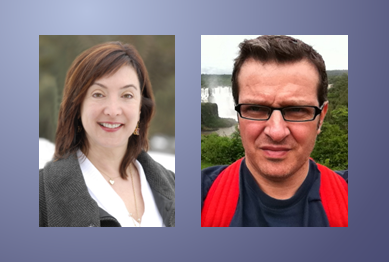Thermal IR Imaging and fNIRS Integration (Winter Institute 2016)

Date: Thursday, 14January 2016
Time: 10:30-12:30
Venue: Room 101 & 104, Runme Shaw Building
Speakers:
Prof. Laura-Ann Petitto
HKU Sin Wai-Kin Distinguished Visiting Professor in the Humanities;
Full Professor, Department of Psychology, Gallaudet University, Washington, D.C. USA;
Co-PI & Science Director, NSF Science of Learning Center, Visual Language and Visual Learning, VL2
Prof. Arcangelo Merla
Director of the Infrared Imaging and Near Infrared Imaging Labs Institute for Advanced Biomedical Technology (ITAB), University of Chieti, Italy
Focus of this workshop: Integration of new technology. The focus of this Workshop is on the powerful science possibilities that arise when Thermal Infrared Imaging is integrated with other technologies (like functional Near Infrared Spectroscopy and Eye Tracking) and the fundamental Science of Learning questions that we can now address for the first time.
Abstract: The primary focus of this workshop is to explore together the powerful Science of Learning questions that can be answered through the integration of Thermal Infrared Imaging with other contemporary neuroimaging and behavioral measures.
The recent advance of new technology has permitted unprecedented views into the human brain, mind, behavior, and higher cognitive, social, and emotional intelligence, as well as exciting views into how humans interact with and learn from technology. One particular system, Thermal Infrared Imaging, is non-invasive technology that measures vital signs, psychophysiological responses, and emotional-affective-arousal states that are linked to higher cognition, learning, and memory. Alone, Thermal IR imaging has already proven powerful, but recent new science initiatives to integrate Thermal IR imaging with other modern technology—like fNIRS, Eye-tracking (and to come, EEG)—are proving to have powerful application to studies in the Science of Learning, including those that embrace research priorities at the University of Hong Kong, for example, collaborative learning, learning across social settings, human-machine interactions, human learning and assessment in “digital citizenship,” and the measurement of emotion, stress, and mindfulness across the lifespan.
About the speakers
Professor Laura-Ann Petitto, a Cognitive Neuroscientist, is the Co-Principal Investigator, and Science Director, of the USA’s National Science Foundation’s Science of Learning Center, “Visual Language and Visual Learning, VL2” at Gallaudet University. She is also a Full Professor in the Department of Psychology at Gallaudet, an affiliated Full Professor in the Department of Psychology at Georgetown University, and the Scientific Director of her own Brain and Language Laboratory for Neuroimaging. Petitto is known for her role in the creation of the new discipline Educational Neuroscience, and she is one of the Co-Founders as well as Chair of the Steering Committee of the PhD in Educational Neuroscience program at Gallaudet University—the first program of its kind to be created in the United States. Petitto is renowned for her scientific discoveries concerning language and its neural representation in the human brain, how young children acquire language, the shared signed and spoken language processing sites and systems in the human brain, the Bilingual Brain (including sign and spoken bilinguals), and the Reading Brain (including how young signing children use a Visual Sign Phonology en route to deriving meaning from print). Petitto received her Masters Degree in 1981 and Doctoral Degree in 1984 from Harvard University’s Graduate School of Education, Department of Human Development and Psychology (“Psycholinguistics, Language and Cognition Track”). Petitto has won continuous Federal and/or Foundation funding for the past 30 years. She is the recipient of over 35 international prizes and awards for her scientific achievements and discoveries, including the 1998 Guggenheim Award for her “unusually distinguished achievements in the past and exceptional promise for future accomplishment in the Neurosciences.” In 2009, Petitto was appointed a Fellow of the American Association for the Advancement of Science, and a Fellow of the Association for Psychological Science (APS). See http://www.gallaudet.edu/petitto.html
Professor Arcangelo Merla is the Director of the Infrared Imaging and Near Infrared Imaging Labs Institute for Advanced Biomedical Technology (ITAB), University of Chieti, Italy. He is an expert in the fields of biomedical image and modeling with emphasis on clinical and biomedical applications of infrared imaging, functional infrared image in psychophysiology, and objective evaluation of stress and arousal in ecological conditions and real life situations.


